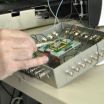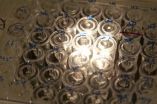(Press-News.org) Dogs have long been called man's best bomb detector –– until now.
A Tel Aviv University scientist leads a research team that has developed a powerful electronic sensor to detect multiple kinds of explosives –– including those used in the recent Yemeni bomb threat. Based on nanotechnology advances, the new sensor is small, portable, and is more sensitive and reliable at detecting explosives than any sniffer dog, says its lead researcher Prof. Fernando Patolsky of Tel Aviv University's Raymond and Beverly Sackler School of Chemistry.
With scientific findings on it published recently in the prestigious Angewandte Chemie, the new device is attracting considerable attention from security companies and fellow scientists.
Capable of detecting numerous types of explosives, Prof. Patolsky says the sensor is especially effective at detecting TNT. Existing methods and devices used to trace the explosive have the drawbacks of high cost, lengthy decoding times, size, and a need for expert analyses: "There is a need for a small, inexpensive, handheld instrument capable of detecting explosives quickly, reliably and efficiently," says Patolsky.
According to the researchers, this new sensor can out-sniff even a champion sniffer canine.
Portable and hidden from view
The device is made from an array of silicon nanowires, coated with a compound that binds to explosives to form an electronic device –– a nanotransistor. In order to enhance the chips' sensitivity even further, the scientists developed each one with 200 individual sensors that work in harmony to detect different kinds of explosives with an unprecedented degree of reliability, efficiency and speed.
One major advantage of the new sensor is its portability − it can be carried from place to place by hand. It is also capable of detecting explosives at a distance. It can be mounted on a wall, with no need to bring it into contact with the item being checked. And unlike other explosives sensors, it enables definitive identification of the explosive that it has detected. To date. the device has not had a single detection error.
Security companies are taking note. The American company Nanergy Inc. has developed a prototype based on the patent, and is already in contact with potential partners to develop explosives sensors for the commercial market.
Headed by Prof. Patolsky, who recently returned to Israel from Harvard University, the research team is considered to be one of the world's leaders in developing nano-based sensors that can detect chemical and biological molecules.
Such sensors may be used to detect not only explosives, but also biological toxins and threats, such as anthrax, cholera or botulinum. Looking beyond national security, the sensor offers attractive applications in the medical field as well.
INFORMATION:
American Friends of Tel Aviv University (www.aftau.org) supports Israel's leading, most comprehensive and most sought-after center of higher learning. Independently ranked 94th among the world's top universities for the impact of its research, TAU's innovations and discoveries are cited more often by the global scientific community than all but 10 other universities.
Internationally recognized for the scope and groundbreaking nature of its research and scholarship, Tel Aviv University consistently produces work with profound implications for the future.
Out-sniffing bomb-sniffing dogs
Tel Aviv University researcher leads development of swift, small, highly reliable sensor to detect explosives
2010-11-11
ELSE PRESS RELEASES FROM THIS DATE:
GM, Chrysler bankruptcies created troubling legacy, legal scholars say
2010-11-11
CHAMPAIGN, Ill. — The Chrysler and General Motors bankruptcy reorganizations represented a sea change in corporate restructuring, one that could portend the end of our current system of bankruptcy reorganization, according to a published article by two University of Illinois experts in bankruptcy law.
Law professors Charles J. Tabb and Ralph Brubaker argue that the legal principles applied in the GM and Chrysler bankruptcies – two of the largest in U.S. history at $83.5 and $39.9 billion, respectively – were misguided, and ultimately have undermined the distributional ...
'Toxic toy crisis' requires fresh solutions
2010-11-11
Manufacturer recalls of toys, promotional drinking glasses, and other children's products constitute an ongoing "toxic toys crisis" that requires banning potentially harmful ingredients in these products and other changes in policy and practices. That's the conclusion of a new analysis in ACS' Environmental Science & Technology, a semi-monthly journal.
Monica Becker, Sally Edwards and Rachel Massey note that in June the United States government recalled 12 million promotional drinking glasses sold at a fast-food restaurant chain because the painted coating contained ...
Seeing the invisible: New CSI tool visualizes bloodstains and other substances
2010-11-11
Snap an image of friends in front of a window curtain and the camera captures the people - and invisible blood stains splattered on the curtain during a murder. Sound unlikely? Chemists from the University of South Carolina are reporting development of a camera with that ability to see the invisible, and more. Called multimode imaging in the thermal infrared, the new technology could find uses in crime scene investigations and elsewhere, they say in a series of three reports in ACS' Analytical Chemistry, a semi-monthly journal.
Michael Myrick, Stephen Morgan and their ...
DNA repair protein caught in act of molecular theft
2010-11-11
Scientists have observed, for the first time, an intermediate stage in the chemical process that repairs DNA methylation damage and regulates many important biological functions that impact health conditions such as obesity, cancer and diabetes.
The observations focused on the bacterial DNA repair protein AlkB, but the results also apply to several proteins in the same family that play key regulatory roles in humans. Armed with these results, researchers may one day develop methods for blocking the protein's efforts to perform the biologically important demethylation ...
Trojan Horse ploy to sneak protective drug into brains of stroke patients
2010-11-11
Scientists are reporting development of a long-sought method with the potential for getting medication through a biological barrier that surrounds the brain, where it may limit the brain damage caused by stroke. Their approach for sneaking the nerve-protective drug erythropoietin into the brain is medicine's version of the Trojan Horse ploy straight out of ancient Greek legend. It also could help people with traumatic head injuries, Parkinson's disease, and other chronic brain disorders. Their report appears in ACS' Molecular Pharmaceutics, a bi-monthly journal.
William ...
Soft drink could enhance effects of an anticancer drug
2010-11-11
Experiments with an artificial stomach suggest that a popular lemon-lime soft drink could play an unexpected role in improving the effectiveness of an oral anticancer drug. The experiments produced evidence that patients will absorb more of the unnamed drug, tested in Phase I in clinical trials, when taken with "flat" or degassed Sprite. The study appears in ACS' Molecular Pharmaceutics, a bi-monthly journal.
Faraj Atassi and colleagues note that efforts are underway to develop more anticancer medications that patients can take by mouth. However, biological variations ...
U of A researchers can predict heart transplant patient's health earlier
2010-11-11
Michael Mengel, a pathology researcher with the Faculty of Medicine & Dentistry, has found a new way to analyze biopsies from heart transplant patients by looking at their genes. This allows him to make an early prediction whether the transplant is working.
This is extremely important in heart transplant patients because a successful outcome depends completely on doing a biopsy of the heart tissue and prescribing treatments if necessary. In other organs transplants, doctors can use other measurements.
It's hoped the new technology and process developed in the Faculty ...
Guardian angels for seeds
2010-11-11
The seeds that you plant in your backyard garden next spring — and farmers sow in their fields — may have a guardian angel that helps them sprout, stay healthy, and grow to yield bountiful harvests. It's a thin coating of chemicals termed a "seed treatment" that can encourage seeds to germinate earlier in the season, resist insects and diseases, and convey other advantages. These new seed defenders are the topic of an article in the current issue of Chemical & Engineering News (C&EN), ACS' weekly newsmagazine.
C&EN Senior Business Editor Melody Voith describes a boom ...
Stress takes its toll in Parkinson's disease
2010-11-11
CHICAGO --- We all know that living a stressful lifestyle can take its toll, making us age faster and making us more susceptible to the cold going around the office.
The same appears to be true of neurons in the brain. According to a new Northwestern Medicine study published Nov. 10 in the journal Nature, dopamine-releasing neurons in a region of the brain called the substantia nigra lead a lifestyle that requires lots of energy, creating stress that could lead to the neurons' premature death. Their death causes Parkinson's disease.
"Why this small group of neurons ...
New neuronal circuits which control fear have been identified
2010-11-11
Fear is an adaptive response, essential to the survival of many species. This behavioural adaptation may be innate but can also be a consequence of conditioning, during the course of which an animal learns that a particular stimulus precedes an unpleasant event. There is a large amount of data indicating that the amygdala, a particular structure in the brain, is strongly involved during the learning of "conditioned" fear. However, until now, the underlying neuronal circuits have remained largely unknown. Now, research involving several Swiss and German teams and a researcher ...
LAST 30 PRESS RELEASES:
Gut microbiome connected with heart disease precursor
Nitrous oxide, a product of fertilizer use, may harm some soil bacteria
FAU lands $4.5M US Air Force T-1A Jayhawk flight simulator
SimTac: A physics-based simulator for vision-based tactile sensing with biomorphic structures
Preparing students to deal with ‘reality shock’ in the workplace
Researchers develop beating, 3D-printed heart model for surgical practice
Black soldier fly larvae show promise for safe organic waste removal
People with COPD commonly misuse medications
How periodontitis-linked bacteria accelerate osteoporosis-like bone loss through the gut
Understanding how cells take up and use isolated ‘powerhouses’ to restore energy function
Ten-point plan to deliver climate education unveiled by experts
Team led by UC San Diego researchers selected for prestigious global cancer prize
Study: Reported crop yield gains from breeding may be overstated
Stem cells from human baby teeth show promise for treating cerebral palsy
Chimps’ love for crystals could help us understand our own ancestors’ fascination with these stones
Vaginal estrogen therapy not linked to cancer recurrence in survivors of endometrial cancer
How estrogen helps protect women from high blood pressure
Breaking the efficiency barrier: Researchers propose multi-stage solar system to harness the full spectrum
A new name, a new beginning: Building a green energy future together
From algorithms to atoms: How artificial intelligence is accelerating the discovery of next-generation energy materials
Loneliness linked to fear of embarrassment: teen research
New MOH–NUS Fellowship launched to strengthen everyday ethics in Singapore’s healthcare sector
Sungkyunkwan University researchers develop next-generation transparent electrode without rare metal indium
What's going on inside quantum computers?: New method simplifies process tomography
This ancient plant-eater had a twisted jaw and sideways-facing teeth
Jackdaw chicks listen to adults to learn about predators
Toxic algal bloom has taken a heavy toll on mental health
Beyond silicon: SKKU team presents Indium Selenide roadmap for ultra-low-power AI and quantum computing
Sugar comforts newborn babies during painful procedures
Pollen exposure linked to poorer exam results taken at the end of secondary school
[Press-News.org] Out-sniffing bomb-sniffing dogsTel Aviv University researcher leads development of swift, small, highly reliable sensor to detect explosives


